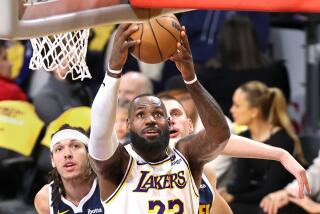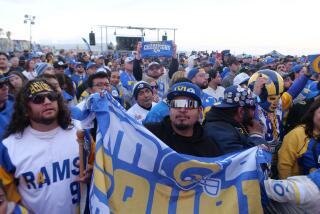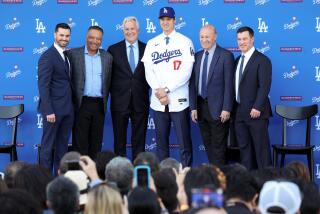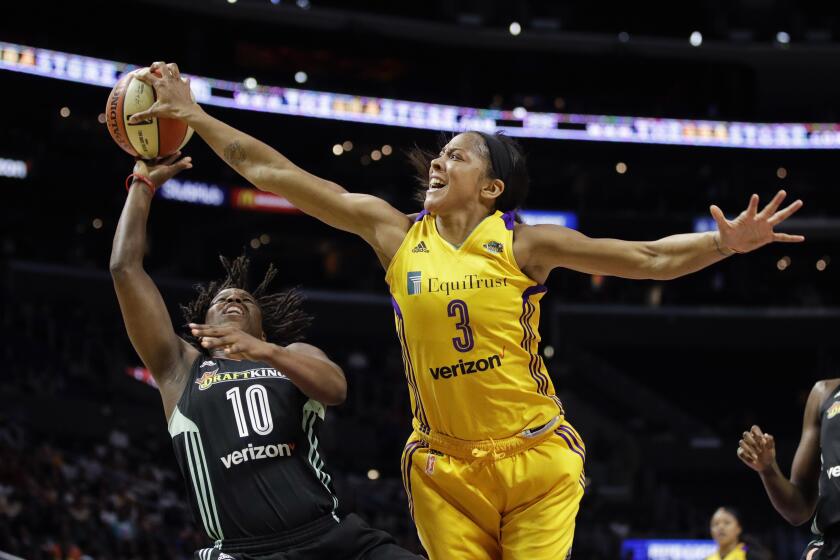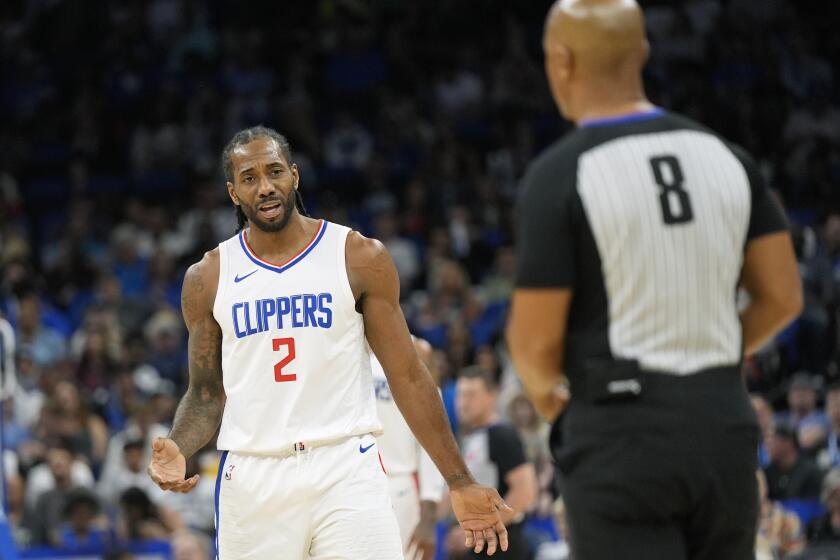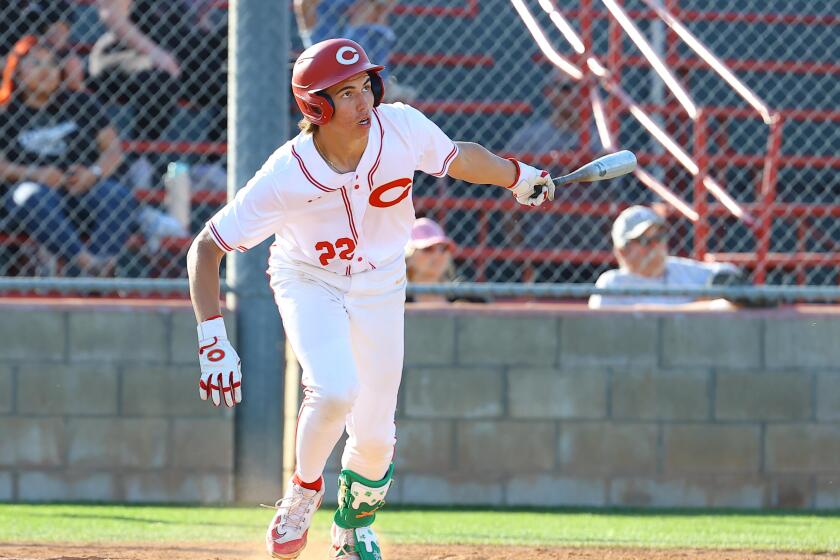His Coverage, and Sense of Humor, Never Missed a Beat
Mal Florence, who combined gritty reporting and skilled news gathering with the art of storytelling in more than half a century in the Sports department with The Times, died Friday after a long illness. He was 77.
One of the city’s most respected print journalists, Florence reveled in a career that spanned generations, crossing paths with the prime newsmakers of more than one era in what was a golden age of sports teams and sportswriting.
Florence, a Los Angeles native, joined The Times in 1951 and retired in 1994. His reporting resume covered most of the sporting best the city had to offer -- the Rams, USC and UCLA football, UCLA basketball, the Lakers, golf, and track and field. He continued his career even after retirement, writing the popular Morning Briefing column for The Times sports pages as a freelancer until shortly before his death.
Possessing a keen reporter’s acumen -- and inside sources -- he often beat his competitors on stories.
He also was known for his needling and was a master of the put-on, as well as the put-down.
Over the years, he enjoyed embellishing his modest career as a USC football player in the late 1940s. He never rose above the junior varsity level, serving as cannon fodder for the varsity.
Once, decades later, when asked if he’d ever played football at USC, he glared at the questioner, then replied icily, “You don’t remember the 98-yard kickoff return against Notre Dame?”
“Oh, sorry ... of course,” the embarrassed questioner sputtered.
Florence was covering the Lakers during the 1971-72 season, when the team ran off its record 33-game winning streak. When the streak finally was ended by the Bucks in Milwaukee, then-sports editor Bill Shirley called Florence and, citing budget restraints, told him to cut his trip short and return to Los Angeles.
Laker Coach Bill Sharman saw Florence checking out of the team’s hotel early the next morning.
“Mal, where are you going?” he asked.
Without missing a beat, Florence snapped, “I don’t cover losers.”
Sharman, when he was coaching the Lakers, was also an unwitting accomplice to one of Florence’s put-ons.
A beginning reporter went with Florence to a Laker game to observe him at work in the Forum press box, high above the court. Florence explained that, because of deadlines, he had to write a portion of his story while the game was going on.
“But when do you find time to write?” the reporter wondered.
Sensing some gullibility, Florence said, “I signal down to the coach if I need a timeout, and he’ll call one.”
Florence was so familiar with Sharman’s style, he knew when the coach usually called a timeout. Sensing that one was imminent, Florence raised his arms and signaled.
Sure enough, Sharman got off the bench and called a timeout.
The young reporter was amazed and the next day in The Times sports department, excitedly went over to Florence’s longtime friend, the late Harley Tinkham, and exclaimed, “Do you know Mal calls timeouts for the Lakers?”
Sharman, later a golfing partner of Florence’s for years, recalled how thrilled Florence was when he learned in 1995 that he’d been voted into USC’s Athletic Hall of Fame, in recognition of his sportswriting career. But, of course, even that honor needed some embellishment.
“I was with Mal one day after that happened and someone asked him if he’d ever played football at USC,” Sharman said. “Mal kind of stared at the guy and said, ‘Why do you think I’m in the SC Hall of Fame?’ ”
Times Sports Editor Bill Dwyre, a Notre Dame graduate, enjoyed many lively exchanges with Florence over the years, especially during USC-Notre Dame week.
One fall, after getting permission from then-managing editor George Cotliar, Florence arranged for the USC marching band, complete with uniforms and sunglasses, to parade into The Times’ newsroom, surround Dwyre’s office and serenade him with 10 minutes’ worth of “Fight On.”
Dwyre ultimately got his revenge. The next fall, when they were covering the USC-Notre Dame game in South Bend, Dwyre offered to show Florence around the campus, making sure they stopped at the Grotto of Our Lady of Lourdes, where students often go to pray.
Notre Dame won that game and Florence knew precisely why.
“It was the grotto,” he said. “Dwyre dragged me off to the grotto and after that, SC didn’t have a chance.”
Once, at the height of John McKay’s coaching success at USC, a visiting sportswriter asked Florence how McKay was to deal with after a loss.
“I don’t remember,” Florence sniffed.
Years later, when USC, after a middling 1992 season, wound up playing Fresno State in the Freedom Bowl in Anaheim, a colleague asked Florence if he would be going to the game. Florence, aghast at the thought of his Rose Bowl-steeped Trojans playing in the Freedom Bowl, against Fresno State, was horrified by the question.
“Good Lord, no!” he said. “What if somebody saw me there?”
Sometimes, though, Florence’s allegiance to USC backfired.
In 1978, a national championship season for the Trojans, USC had won its first four games, then went to Tempe to play Arizona State in its first Pacific 10 game against an Arizona school.
An Arizona State student journalist approached Florence in the press box before the game, asking which team Florence thought would win.
“Remember one thing,” Florence said. “You’re not playing the [New Mexico] Lobos tonight.”
Arizona State won that game, 20-7, handing the Trojans their only defeat in a 12-1 season.
Although Florence was a passionate USC partisan -- he wrote “The Trojan Heritage,” a pictorial history of USC football -- Dwyre recalled his professionally setting aside his personal feelings when it came to covering the Trojans for the newspaper.
“Mal broke the story in 1982 that the NCAA was going to come down hard on USC for football program infractions,” Dwyre said.
“He had a great source on what was a major news story.... Mal took a lot of heat from a lot of SC guys on writing that story. It was tough for him to write it.”
World War II interrupted Florence’s USC student years and he won a Purple Heart without leaving California.
As was often the case with Florence, the actual story wasn’t nearly as exciting as the way he told it. One of his many versions was that he received the injury while rescuing a general, pulling him back into a foxhole during the heat of battle.
The actual story: During an Army Air Corps training exercise on a flight off the California coast, Florence severely cut a finger when he accidentally stuck it into a fan. But it was wartime, the flight was over international waters, so Florence qualified for the medal.
There are nearly as many Florence anecdotes as there were Morning Briefing items springing from his keyboard.
One involved Jim Murray, the late Times Pulitzer-prize winning columnist. Florence and Murray were covering the Masters, which that year was won by Bernhard Langer of Germany. When Langer mentioned his hometown in Germany while talking to reporters, Murray turned to Florence and asked if he’d ever been there.
“Nope, but I’ve been over it,” Florence quipped.
Another time, while working on The Times sports desk, Florence was editing a report about Scottish soccer fans doing pregame exercises to prevent injuries while celebrating goals.
“Wait a minute,” Florence said. “This is soccer. What goals?”
There was more to Florence, though, than quips and braggadocio. After graduating from USC in 1949, he spent a school year in graduate journalism studies at the University of Missouri. His sportswriting won a Los Angeles Press Club award in 1962, one of his Times stories was reprinted in “Best Sports Stories of 1968,” and he was inducted into the U.S. Basketball Writers Assn. Hall of Fame in 2000.
“He was a great reporter,” Dwyre said. “He knew where all the skeletons were buried and he knew how to dig them up.”
Said Terry Donahue, longtime former UCLA football coach and now general manager of the San Francisco 49ers, “I’ll always remember Mal as really one of the old-school professionals. He’d come up as a sports reporter and journalist in the old days and always was able to develop close relationships with coaches, administrators and athletes. He was a pro. He represented an age when there was more trust and there was not so much sensationalism, so he had open and honest communication with the subjects on his beat.”
Florence, who had bone cancer, is survived by sons Jon and Matthew. His wife, Gayle, died in 1996.
Private funeral arrangements are pending.
*
Times staff writers Thomas Bonk, Larry Stewart and Shav Glick contributed to this report.
*
Out of respect for the memory of Mal Florence, longtime author of Morning Briefing, that column will not appear in today’s Times.
More to Read
Get our high school sports newsletter
Prep Rally is devoted to the SoCal high school sports experience, bringing you scores, stories and a behind-the-scenes look at what makes prep sports so popular.
You may occasionally receive promotional content from the Los Angeles Times.
